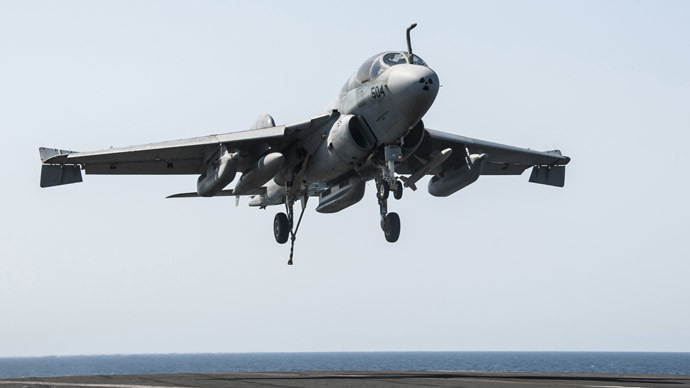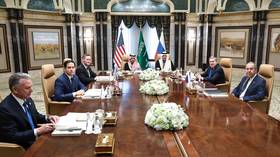‘No such thing as surgical strike so civilian casualties in US anti-IS war inevitable’

Previous US efforts to reduce collateral damages are not working, and since there is no such thing as a precision strike or surgical strike, there are always going to be human victims, Derek Monroe, reporter for Foreign Policy in Focus, told RT.
RT:The White House is saying that the strict standards on civilian deaths that the Administration applies to drone strikes will not be applied to airstrikes in Iraq and Syria. Why do you think that is the case?
Derek Monroe: I think that the degree of outcry that is coming up from the deaths of the civilians - specifically in the areas where al-Nusra Front from time to time aligned with FSA, the so-called Freedom Fighters in Syria. And now there is big outcry over there because of the civilians being killed including women and children. The White House has been very proactive to cover all the fronts as far as the response to the attacks and criticism, not only from the region but also from the West. Because at the end of the day you see a lot of hypocrisy is taking place. There is no such a thing as a precision strike or surgical strike - there are always going to be human victims of any kind of situation, any kind of circumstances, whatsoever. The degree of our previous efforts to reduce our collateral damage is obviously not working. So it is going to go forward. And the White House basically wants to buy itself some alibi or some time for future strikes.
RT:US intelligence admits that it underestimated the initial threat or the scale of ISIS. At this point does it seem that the intelligence has caught up to the point that airstrikes and further actions against ISIS can be effective, or there are still gaps in intelligence that might lead to the possibility of mistakes?
DM: I think the problem is that within the administration there are a lot of different power points which are obviously taking a lot of heat or trying to cover up their own behinds as far as the lack of analysis, the lack of actionable intelligence. I think this is the first thing which has to become emphasized. Second of all, the lack of information on the ground also reflects the degree of our blindness, to the way we are actually evaluating the threats, how we valuing the capabilities. Just look what happened with the Iraqi army. Where was the $25 billion spent, they were supposed to be viable fighting force, and how quickly that disappeared. So you have to realize just from the issues, not only from the external foreign policy but also internal Pentagon games, and Pentagon political struggles which are taking place. Because at the end of the day the White House definitely would like to see some accountability, certainly on the ground in Iraq and in Syria but also within its own echelons of power in the Pentagon.
RT:What kind of effect are the airstrikes, do you think having on the civilian population in Syria and Iraq where ISIS is operating?
DM: There is no denying that attacks were widely accepted and also welcomed by people who are and were suffering on the IS war in Syria and Northern Iraq. So there is definitely some positive movements as far as people are getting galvanized, getting at least emotional and material support from fighting against IS. However, it cannot be underestimated also the degree of harm that is being done to people, who are being innocently killed. I think there is really a rather tragic double- edged sward which is taking place right now. You cannot speak for the victims’ families, the best you can do is just offer them sympathy. Because at the end of the day a lot of innocent people are going to be getting hurt one way or the other. There is no good solution here.
RT:As many as 12 civilians were killed by a recent American Tomahawk missile strike in Syria. Why is the international community not speaking up against the deaths of innocent people?
DM: I think as you can probably tell from the coverage of the international media, especially US media, I think the population here … is really kind of kept in the dark exactly by what is really taking place. First of all, there is no access for foreign journalist to be on the ground in Syria and IS-controlled areas, which is understandable why there are no journalists there. Second of all, I think there is also the degree of everybody falling into line behind the White House specifically with their policy to fight against terrorism in Syria and Northern Iraq. There are just a lot of different agendas which are being played here. And there is very little reference as far as getting real actionable information on the ground at this point. I think something that I would say is a perfect storm of different circumstances which comes in together. That is why we are not getting good information out of Syria right now.
The statements, views and opinions expressed in this column are solely those of the author and do not necessarily represent those of RT.
The statements, views and opinions expressed in this column are solely those of the author and do not necessarily represent those of RT.














